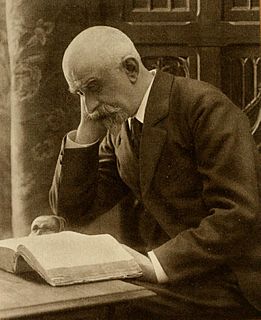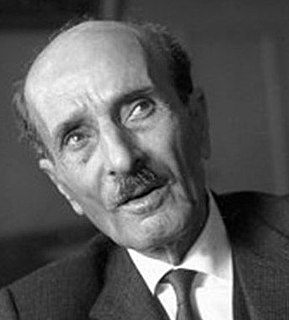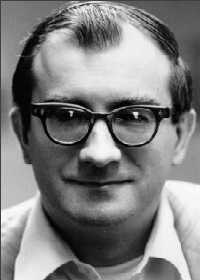A Quote by Joris-Karl Huysmans
In this game he had acquired a great deal of muddled knowledge, more than one approximation and less than one certitude. And absence of energy, a curiosity that was too sharp to be crushed immediately, a lack of order in his ideas, a weakening of his spiritual boundaries, which were promptly twisted, an excessive passion for running along forked roads and wearying of the path as soon as he had started on it, mental indigestion demanding varied dishes, quickly tiring of the foods he desired, digesting almost all, but badly, was his state.
Quote Topics
Absence
Acquired
Almost
Almost All
Along
Approximation
Badly
Boundaries
Certitude
Crushed
Curiosity
Deal
Demanding
Desired
Dishes
Energy
Excessive
Foods
Game
Great
Great Deal
Had
His
Ideas
Immediately
Indigestion
Knowledge
Lack
Less
Mental
More
Order
Passion
Path
Quickly
Roads
Running
Sharp
Soon
Spiritual
Started
State
Than
Tiring
Too
Twisted
Varied
Weakening
Were
Which
Related Quotes
According to true military art, one should never push one's enemy to the point of despair, because such a state multiplies his strength and increases his courage which had already been crushed and failing, and because there is no better remedy for the health of beaten and overwhelmed men than the absence of all hope.
Emile Saint-Blague had been a lively, versatile painter in his youth, but he had abused his energy by painting too many pictures; so that in what might have been the ripe period of his art he had nothing left but ideas. A man who has nothing left but ideas may be of great service to his friends, but he is of no use at all to himself. Emile was certainly an inspiration to his friends.
Foresight is good when it is subject to the latter, but it becomes excessive when we are in a hurry to avoid something we fear. We rely more on our own efforts than on those of his Providence, and we think we are doing a great deal by anticipating His orders by our own disorder, which causes us to rely on human prudence rather than on his Word.
Man is more than his environment. It is from the innate quality of the Spirit in him, his inner storehouse, that he draws those ideas, his intuitions, which unify his perceptions of the external world instantaneously with a value which is qualitative and not quantitative, and which he embodies in the works of his culture - those achievements which belong not only to one particular time but to all times, and mark the path of his upward progress.
The Socratic maxim that the recognition of our ignorance is the beginning of wisdom has profound significance for our understanding of society. Most of the advantages of social life, especially in the more advanced forms that we call "civilization" rest on the fact that the individual benefits from more knowledge than he is aware of. It might be said that civilization begins when the individual in the pursuit of his ends can make use of more knowledge than he has himself acquired and when he can transcend the boundaries of his ignorance by profiting from knowledge he does not himself possess.
The important thing is not so much that every child should be taught, as that every child should have the opportunity of teaching itself. What does it matter if the pupil know a little more or a little less? A boy who leaves school knowing much, but hating his lessons, will soon have forgotten all he ever learned; while another who had acquired a thirst for knowledge, even if he had learned little, would soon teach himself more than the first ever knew.
His face set in grim determination, Richard slogged ahead, his fingers reaching up to touch the tooth under his shirt. Loneliness, deeper than he had never known, sagged his shoulders. All his friends were lost to him. He knew now that his life was not his own. It belonged to his duty, to his task. He was the Seeker. Nothing more. Nothing less. Not his own man, but a pawn to be used by others. A tool, same as his sword, to help others, that they might have the life he had only glimpsed for a twinkling. He was no different from the dark things in the boundary. A bringer of death.
All these, however, were mere terrors of the night, phantoms of the mind that walk in darkness; and though he had seen many spectres in his time, and been more than once beset by Satan in divers shapes, in his lonely pre-ambulations, yet daylight put an end to all these evils; and he would have passed a pleasent life of it, in despite of the devil and all his works, if his path had not been crossed by a being that causes more perplexity to mortal man than ghosts, goblins, and the whole race of witches put together, and that was - a woman.
To blindly trust government is to automatically vest it with excessive power. To distrust government is simply to trust humanity - to trust in the ability of average people to peacefully, productively coexist without some official policing their every move. The State is merely another human institution - less creative than Microsoft, less reliable than Federal Express, less responsible than the average farmer husbanding his land, and less prudent than the average citizen spending his own paycheck.
I'm serious, Harry, don't go." But Harry only had one thought in his head, which was to get back in front of the mirror, and Ron wasn't going to stop him. That third night he found his way more quickly than before. He was walking so fast he knew he was making more noise than was wise, but he didn't meet anyone. And there were his mother and father smiling at him again, and one of his grandfathers nodding happily. Harry sank down to sit on the floor in front of the mirror. There was nothing to stop him from staying here all night with his family. Nothing at all.
He could feel it immediately when his shoulder snapped - the intense pain of his bones cracking. His skin tightened, as if it could no long hold whatever was lurking inside him. The breath was sucked from his lungs like he was being crushed. His vision began to blur, and he had the sensation he was falling, even though he could feel the rock tearing at his flesh as his body seized on the ground.







































